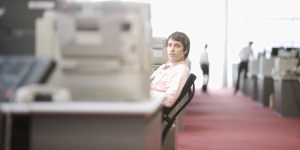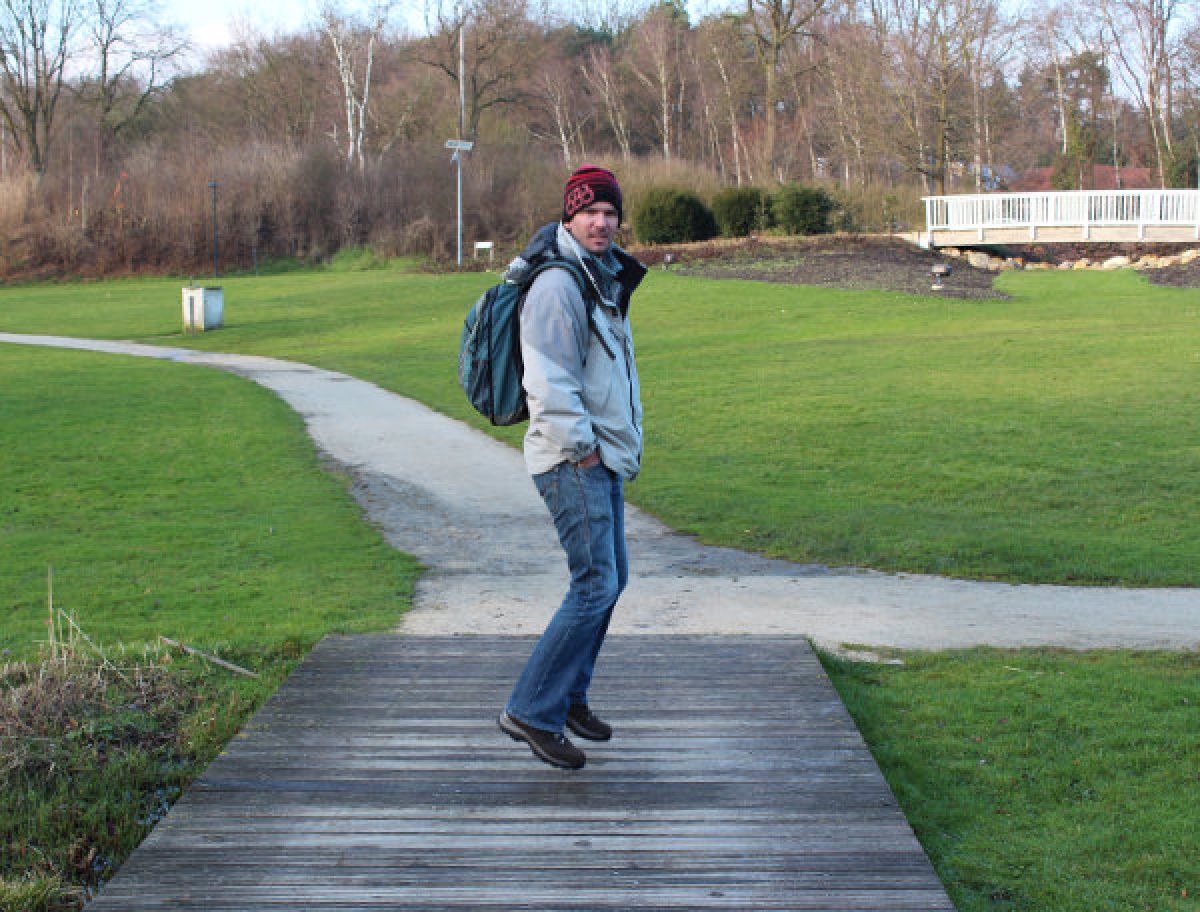
Where are you from, Sean, and what are you doing nowadays?
I was born and raised in South Africa. A professional truck driver, I also worked for many years as a safari tour guide and tour bus driver around South Africa, Namibia, Botswana, Zimbabwe, Zambia, Mozambique, Lesotho & Swaziland. I have worked a few months on a Kibbutz in Israel as well as on a few ski resorts in the USA, Europe, and yes, South Africa. I have also volunteered in West African countries such as Sierra Leone, Liberia, Gambia, Togo and Benin. I now work in automotive production and live in Genk, Belgium with my wife Sabine whom I met on Safari in Namibia. I have traveled to 35 countries since 1994, Sabine a few more. So collectively, there are about 50 unique destinations between the two of us. With our blog, we are sharing our experience in the hope of inspiring others to do maybe just some of the amazing things that we have done.
Why did you choose to expatriate to Belgium?
Maybe it is the seemingly unending variety of beer here, it may take the better part of my life to try them all. South Africa is well known for its variety of fine wine, Belgium for its gourmet beer, among other things. Although that may be only a small reason why we decided to relocate. Sabine and I both love traveling Africa and the rest of the world. We own a 1998 model Land Rover Defender for use when in Africa, and I have all my family in South Africa, but we thought it might serve us well to put the proverbial roots down in Europe, and it just so happens to be Sabine's home town of Genk where we are planning to do just that.
As a South African national, what where the procedures you had to follow to move there?
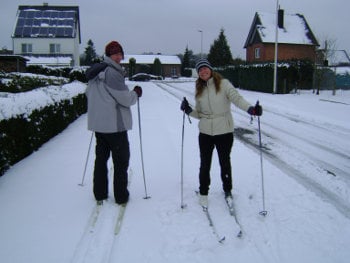
The requirements from Belgium to move here on the basis of an existing civil South African marriage to a Belgian national are fairly straight forward. In fact, if you are a South African citizen intending to marry a Belgian, I recommend to get married in South Africa, then move to Belgium. After we got married, in South Africa, and using just the English version of our unabridged marriage certificate, I applied for and got quite quickly a Schengen D visa at the Belgian Consulate in Rosebank, South Africa. Once in Belgium, we went to the local city hall, or gemeente huis and submitted our marriage and my birth certificate both with Apostille, which you get in South Africa. Such documents also need to be officially translated into Dutch. About a week after submitting just those two papers, the police came for a visit, just to check whether I was living where I said I was and that I was legitimately married to and living with my Belgian wife. The police will visit all foreigners wishing to live here on a long term. We drank tea and ate some cookies with them, but there is no fooling them, they will know if your marriage is not real. It also helped that Sabine's parents were present and have been and still are in good standing with the local community for the last 50 years, so they could vouch for us. Another week or so and I had my F-card which allowed me to open a bank account, work, and pay tax, of course. Once I had my resident card though, I still had to follow a compulsory but free integration course, as well as a Dutch language course. This they will set up for you, courtesy of the Belgian government. Failing to attend and pass these courses will result in the cancellation of your residence permit. As I mention elsewhere in this interview, depending on your own unique personal situation, things might go differently for you. We also did this a long time ago, so I might have forgotten something or got the order of things slightly wrong, so do your Googling.
How long have you been in the country?
Just over 5 years, and counting.
In which city are you currently living? What has attracted you there?
Genk, in the East, not to be confused with Ghent which is more over to the West of the country. What attracted me here? My wife who was born and raised in Genk.
What has surprised you the most at your arrival?

The sheer speed and very reasonable price of the internet (we spend a lot of time on it) as well as the efficiency of the place. Things work here, things get done. Although it shouldn't come as a big surprise that western Europe is maybe just a little more efficient than some other places. Also, the cultural diversity of Belgium in general is a pleasant surprise.
Was it difficult to find accommodation there? What are the types of accommodation which are available there?
Not difficult at all, for me. We moved in with Sabine's parents. At least, they are retired and spend most of the year living in a caravan in the south of Spain. So we are permanent house-sitters who do pay rent. Types of accommodation in Genk vary, from full houses for over € 300,000, to your run of the mill apartment blocks and council housing. I guess it all depends on your standard of living and what you require to consider yourself comfortable. You could buy a single-bedroom 40 square meters apartment for about € 100,000, depending on the exact area. Rental apartments go for around € 600 a month, excluding utilities. Depending on your cash flow, accommodation is not hard to find. There is plenty of it.
What are the local labor market's features? Is it easy for an expat to find a job there?
It all depends on exactly what you would like to do here and what qualifications you have, but most importantly, you need to speak the language. In the Northern half of Belgium, the better Dutch you speak, the better are your chances of finding work. It will be French in the Southern half as well as in the Brussels region. There are many government and private run employment agencies, such as vdab.be, asap.be, randstad.be, to name but a few. You can quite easily create an online profile and upload your CV and details. You can also sign up for email notifications as to when new jobs are posted that fit your job profile. So yes, it can be fairly "easy" to find a job here, especially if you are highly qualified.
How do you find the Belgian lifestyle?

I love it. Belgians respect each others privacy. They can be reserved at times, but they are also very friendly, helpful and accommodating once you get to know each other. I can be a little introvert and do enjoy my own company, so when I am out alone, people don't bother me, and that's what I like about it here. But myself and most Belgians love a good party too, when the time is right. That is more or less how things work here.
Have you been able to adapt yourself to the country and to its society?
Yes, absolutely. At least, I like to think I can fit in almost anywhere. From Canada, to the USA, to South Africa, to Belgium, I can adapt. From social events, to various activities such as a walk in the local forest, I am finding it more and more satisfying living here. You know the saying: "When in Rome." Well, I do just that. I observe, then I do more or less the same.
What does your every day life look like in Genk?
First things first: coffee, everyday. We spend about € 4 a week on coffee, which we get at a local supermarket, and it is good real coffee. Then, after a typical continental breakfast and said caffeine fix, if it is a work day, I go to work. Often, I work on the early shift. So I am home by 4 pm. With the sun only setting 6 hours later in mid-summer, I still have plenty of time to go sit on a local café terrace, or take a walk around the lake, or ride my bike. On days off, I do most all of the above, minus the work. Maybe I'll sleep late, then mow the lawn, or drink a beer on my own terrace, where I have been writing this right. I think Sabine and I live a fairly simple uncomplicated life here in Belgium. We often hear people complaining how busy and complicated things are here. We try convince them things are only as complicated as they make them.
Any particular experience in the country you would like to share with us?
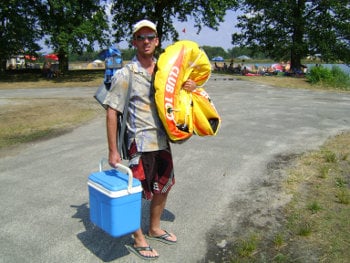
For me, the paperwork involved in settling here has been pretty painless, it has gone fairly smoothly. At least once I had extracted the required papers from the relevant South African authorities, Belgian paperwork went fine. Sabine has helped a lot with it all as I'm useless with paperwork. Of course, this can be different depending on your own personal situation, and the part of Belgium you would like to settle in as not all administrative centers are the same. I haven't had much other administrative experience around Belgium, but if you do decide to make Genk your home, you should be impressed with their efficiency.
What is your opinion on the cost of living in Belgium? Is it easy for an expat to live there?
For Sabine and I, we find it quite affordable, considering our own personal way of life and living standards. We don't have the latest gadgets or clothes, and we can be quite frugal when it comes to these things. My laptop is 4 years old but it still does its job, so I see no point in replacing it. We shop at local markets where food can be about half the price compared to regular supermarkets. We don't eat out at fancy restaurants. We get around town by bicycle and foot. Netflix, while it has mostly older movies and series, is way cheaper than the movie houses, way cheaper. Cable TV, with about 85 channels, movies included, plus a land line with free calls across Europe, plus 200 GB broadband Internet will set you back around € 65 a month. That said, if you are an expat who would like to run an online business in Belgium, connectivity is excellent, to say the least. There are plenty of options here that will save you money, as long as you pay attention to what you sign up for. In summary, I find it fairly easy living here. Most other expats should too.
How do you spend your leisure time?
We take walks in the local forests and around the many lakes. In summer, I swim in the lakes. We also ride our bicycles. With such excellently laid out cycle paths and Belgium being as flat as it is, cycling is a pleasure here. It is in fact a national obsession, in a good way. We also spend time in the fantastically huge local library here in Genk, with its vast collection of books, CD's, DVD's and super fast free Wi-fi. There are also music festivals and street parades which we make a point of attending. We may also just stay at home and watch movies or read books, or just visit and hang out with friends or relatives. If there is enough snow, we ski down the street, or at 1 of about 3 small downhill slopes in Belgium.
Your favorite local dishes?
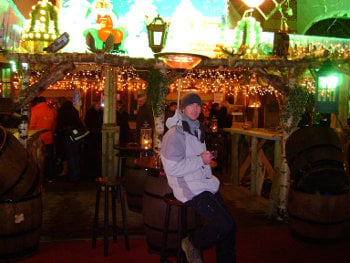
Maybe not the most healthy options, but almost anything you get at a Frituur. These are local chips or French fries shops where everything is deep fried, and not very expensive at all. One of my favorite proper Belgian dishes is stoof potje which is a type of beef stew. Yummy. It goes very well with French fries and red wine. There is also a very strong international community from Turkey, Morocco, Greece and Italy, to name but a few of the countries that have had a big influence on the local cuisine. I also enjoy eating at any of the great kebab shops around Genk. A kebab meal will cost about € 5.
What do you like the most about the country?
There are many things, but mostly the efficient use of space, the administration system, the price and speed of cable broadband internet, as well as the beer and variety of food.
What do you miss the most about South Africa, your home country?
The mountain scenery and the thousands of kilometers of beaches and long open roads. Although seeing as we go back to South Africa to visit friends and family there at least once a year, we don't miss it that much.
Would you like to give any advice to soon-to-be expatriates in Belgium?
Do your (Google) research and make sure you have the right papers, in the right Belgian language, from your home country before you come here, and you will have far fewer problems. Learn the local languages, Dutch for the North (Flanders) or French for the South (Walonia & Brussels). German, while also an official language in Belgium, is spoken by a very small part of the population. Even though Belgians are friendly, they will appreciate it if you respect their privacy and personal space and to keep to yourself at certain places and times, such as in the train or library. At a street festival/parade, and there are many of those, by all means, go wild and make friends!
What are your plans for the future?
We don't really have any concrete plans at the moment. We are working on those. We live life a few months at a time. To tell the truth, we still have every intention of traveling, and blogging, a whole lot more.

